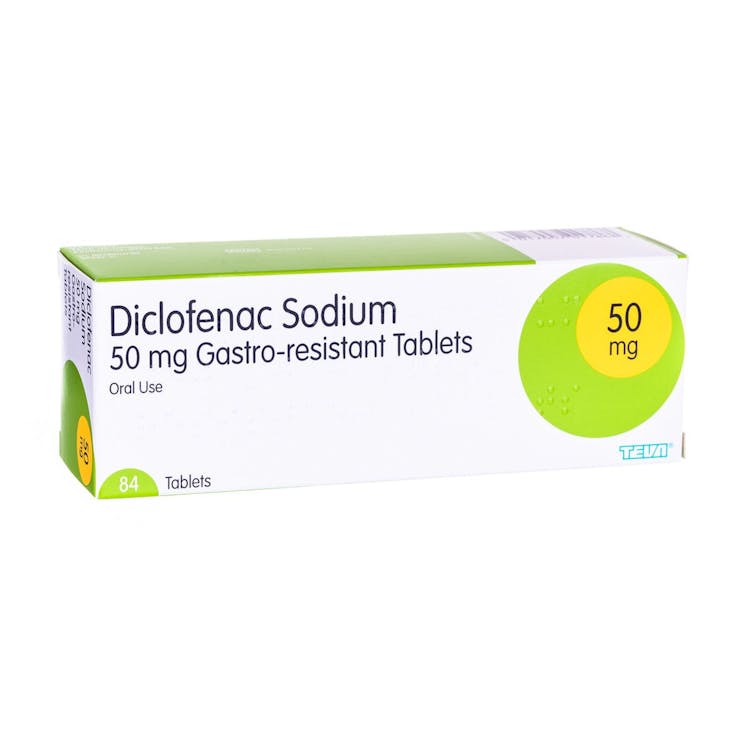- Home
- Chronic Conditions
- Gout Treatment
- Diclofenac
Diclofenac
Images for illustrative purposes only
Diclofenac is a pain killer that is regularly prescribed to reduce pain or swelling. It is a commonly prescribed medication for treating attacks of gout. Gout causes inflammation of the joints, particularly of the big toe.
Diclofenac is part of the medicines group known as Non-Steroidal Anti-Inflammatory Drugs (NSAIDs). Other medications in this group include ibuprofen and naproxen.
- NSAID (non-steroidal anti-inflammatory drug)
- Treats attacks of gout
- Relieves pain
- Genuine medication
- Shipped from EU Pharmacies
More information
About Diclofenac for Gout
- Diclofenac helps to reduce pain and swelling in a number of conditions including gout
- It is available in several forms including tablets and capsules
- Diclofenac is sometimes known by its brand names Voltarol or Arthrotec
- It is not suitable for everyone, including those with stomach ulcers or asthma
- It is important to read the patient leaflet for a full list of side effects and cautions.
How Does Diclofenac for Gout Work?
Gout is an inflammatory condition that causes a build-up of uric acid crystals in the joints. The joint most often affected by gout is the big toe. The crystals cause irritation that is extremely painful. The body also produces prostaglandins, causing swelling and inflammation at the site of gout.
Diclofenac prevents prostaglandins from being made by blocking cyclo-oxygenase (COX) enzymes. Taking diclofenac therefore blocks the biological pathway that causes pain and swelling. This helps to reduce symptoms to alleviate discomfort.
How is Diclofenac Taken?
Diclofenac tablets should be swallowed whole with a glass of water. It is best to take diclofenac with food or just after eating to reduce the risk of digestive side effects.
Diclofenac should only be taken as prescribed when you have an attack of gout.
Dosage of Diclofenac for Gout
The maximum dose of diclofenac is 150mg. This will usually be taken in two or three doses divided throughout the day. For example, you may be prescribed 50mg diclofenac to be taken three times daily.
Elderly patients may be prescribed a lower dose of diclofenac.
Are there any Side Effects?
Like all medications, diclofenac can have some side effects. The most common side effects include:
- Stomach ache or reduced appetite
- Nausea or vomiting (feeling sick or being sick)
- Headaches
- Dizziness
- A mild rash
These side effects are likely to settle down, but if they persist or become troublesome you should speak to your doctor for further advice.
Rarely, more serious side effects can occur. You should call your doctor straight away if you experience:
- Blood in your vomit or stool (poo), or black stools
- Severe indigestion or stomach pain
- Diarrhoea or vomiting
- A raised or itchy rash
- Yellowing of the skin or whites of the eyes – this could be a sign of a problem with your liver.
Call 999 if you experience:
- Breathlessness, swollen legs or ankles – these could be signs of heart failure
- Chest pain, breathlessness, or a feeling of anxiety or impending doom – these could be a sign of a heart attack
- Weakness, change in speech, blurred eyesight, or loss of balance – these could be caused by a stroke.
Serious allergic reactions happen very rarely. If you have a severe allergic reaction (anaphylaxis) including breathlessness, lip swelling or tongue swelling, call 999 immediately.
Diclofenac for Gout Warnings
Diclofenac may not be suitable for everyone. You should tell your doctor if you have:
- Ever had an allergic reaction to a medication, including aspirin or other NSAIDs such as ibuprofen or naproxen
- Asthma
- Crohn’s disease or ulcerative colitis
- Stomach ulcers
- Kidney disease
- Liver disease
- Heart failure
- High blood pressure
- Lupus
- Problems with blood clotting.
You should also tell your prescriber if you are pregnant or trying to conceive, as there may be a different pain relief medication that would be more suitable.
Some medications can interact with diclofenac. You may be advised that diclofenac will not suit you if you already take:
- Lithium
- Digoxin
- Diuretics (also known as “water tablets”)
- Medications for high blood pressure or heart failure
- Ciclosporin
- Tacrolimus
- Trimethoprim
- Warfarin or another blood thinning medication
- Another NSAID such as ibuprofen or naproxen
- Certain antidepressants
- Medications for diabetes
- Methotrexate
- Certain antimicrobial and antifungal medications
- Phenytoin.
Because diclofenac may not suit everyone, we will complete a Consultation with you including a health questionnaire. This will ensure that the medication will be suitable for you.
A qualified prescriber will review your current medications, including any herbal remedies or supplements, to ensure that diclofenac will not interact with them.
Once prescribed, diclofenac will be ordered on your behalf via electronic prescription. Diclofenac will then be conveniently dispatched from one of our partner pharmacies.

Here to help you
Our Customer Service is available Monday to Friday 9am - 4pm. If you need urgent assistance, do not use this service. Call 111, or in an emergency call 999. Visit our help section



